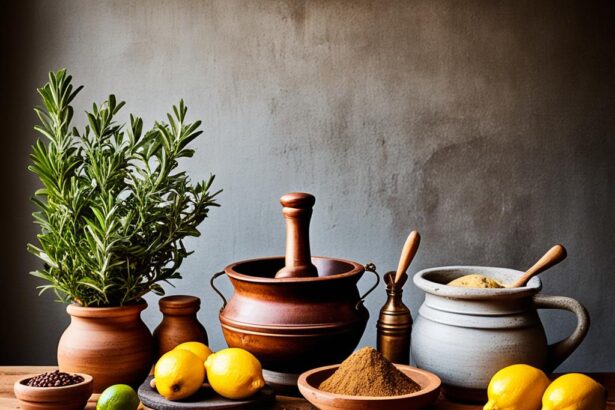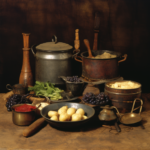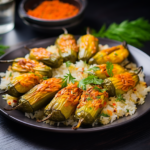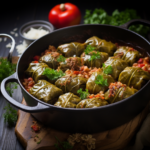Greek cuisine offers a delicious range of food. From gyros and souvlaki to refreshing salads and complex pastries. To make these dishes truly authentic, the right tools are essential. Creating Greek dishes is an art. It’s more than passion and skill. It requires special kitchenware that honors traditional methods.
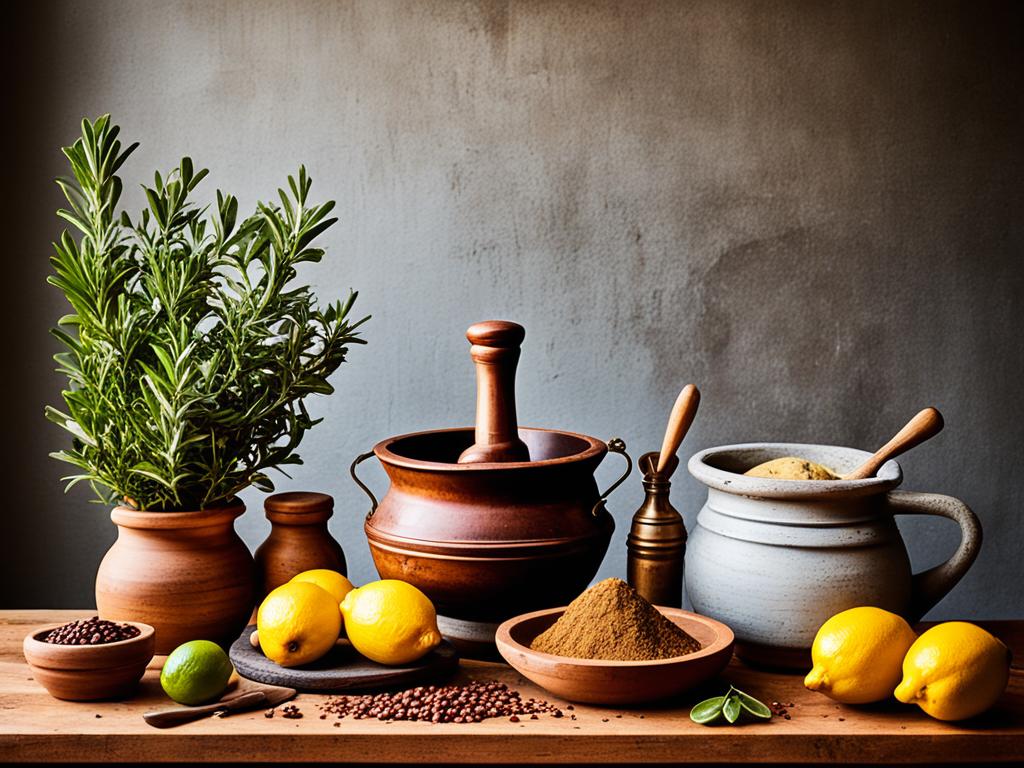
Using the correct Hellenic culinary tools is key. They ensure every dish maintains the rich, diverse flavors of Greek cuisine. These tools are crucial for food preparation. They also help achieve the authentic taste and texture of traditional Greek recipes.
Key Takeaways
- 15 essential kitchen tools are identified for creating Greek dishes.
- Important knives include a chef’s knife, Santoku knife, paring knife, boning knife, utility knife, and bread knife.
- Wooden cutting boards are highlighted for safe and effective food preparation.
- A mortar and pestle enhance flavors by grinding spices and fresh herbs.
- An olive oil can is recommended for convenient and precise dispensing in Greek cuisine.
Greek cuisine offers a delicious range of food. From gyros and souvlaki to refreshing salads and complex pastries. To make these dishes truly authentic, the right tools are essential. Creating Greek dishes is an art. It’s more than passion and skill. It requires special kitchenware that honors traditional methods.
Using the correct Hellenic culinary tools is key. They ensure every dish maintains the rich, diverse flavors of Greek cuisine. These tools are crucial for food preparation. They also help achieve the authentic taste and texture of traditional Greek recipes.
Key Takeaways
- 15 essential kitchen tools are identified for creating Greek dishes.
- Important knives include a chef’s knife, Santoku knife, paring knife, boning knife, utility knife, and bread knife
- Wooden cutting boards are highlighted for safe and effective food preparation.
- A mortar and pestle enhance flavors by grinding spices and fresh herbs.
- An olive oil can is recommended for convenient and precise dispensing in Greek cuisine.
Master Your Kitchen with These Essential Greek Cooking Utensils: A Guide to Traditional Greek Cooking Equipment, Classic Greek Kitchen Essentials, and Ancient Greek Cooking Tools
Enhance your culinary skills by discovering the best Greek cooking tools and essential Greek cooking utensils. Dive into the world of authentic Greek recipes with the right equipment at your fingertips.
Kitchen Knives and Cutting Boards
Preparing iconic Greek dishes requires the right kitchen tools. Every well-equipped kitchen should have top-notch knives and robust cutting boards. These essentials make cooking easy and fun, and they help keep your dishes authentic and tasty.
Types of Essential Knives
Chef Jean-Pierre highlights the need for varied knives for different kitchen tasks. With over 50 years of experience, he knows his stuff. Here are the knives you’ll want:
- Chef’s Knife: It’s versatile, perfect for chopping, slicing, and dicing. A must-have for any kitchen.
- Santoku Knife: Ideal for precise slicing and dicing, especially veggies and fish.
- Paring Knife: Great for peeling and intricate cuts on fruits and veggies.
- Boning Knife: It’s made for easily removing meat and fish bones.
- Utility Knife: A go-to for daily tasks, like trimming meat or slicing sandwiches.
- Bread Knife: It cuts bread and pastries without squishing them.
Quality knives can transform your cooking. Chef Jean-Pierre reminds us that good knives last for decades. He has some that are over 30 to 40 years old and they still work great.
Choosing the Right Cutting Boards
The right cutting board makes all the difference. It ensures a stable cutting surface, boosting your kitchen performance. Here’s what to look for:
- Wooden Cutting Boards: They’re known for their durability and for being kind to knives. The usual size is 12-by-18 inches, but bigger boards offer more room. They should be 1 ¼ to 2 inches thick for stability.
- Rubber Cutting Boards: These are tough, easy to clean, and gentle on your knives. They’re between ½ and 1 inch thick, providing a firm cutting area.
For best performance, choose end grain cutting boards at least 2 inches thick. Remember to wash and dry your wooden boards carefully. Oil them with food-safe mineral oil every few weeks to keep them in top shape.
| Type of Cutting, Board | Recommended Size | Thickness | Benefits |
|---|---|---|---|
| Wooden | 12-by-18 to 24-by-36 inches | 1 ¼ to 2 inches | Durable, Self-healing, Knife-friendly |
| Rubber | Various | ½ to 1 inch | Easy to clean, Durable, Knife-friendly |
| End Grain Wooden | Various | At least 2 inches | Durable, Knife-friendly |
With the right knives and cutting boards, your kitchen becomes more efficient and fun. These tools are crucial for perfecting Greek cuisine, whether you’re using athenian cookware or delian tableware.
Mortar and Pestle: Ancient Greek Culinary Equipment
The mortar and pestle have a long history, going back to the Stone Age. It is a key icon in ancient Greek culinary tools. In Greek cooking, it holds a special place and is still priceless in kitchens around the world today.
Its historic value comes from its power to release full flavors from herbs and spices. This is crucial for blending the varied tastes in Mediterranean foods. When making pesto or crushing garlic, the mortar and pestle keep the freshness and essence of the flavors.
Using Mortar and Pestle in Greek Cuisine
In Greek cuisine, fresh ingredients are a must, and the mortar and pestle keep their flavors alive. Besides taste, they also help with getting the right texture. This tool is key for making dishes like hummus, spice mixes, or traditional Greek sauces.
This tool’s flexibility shines through in its use in different dishes, including starters, main courses, and desserts. For a classic Greek yogurt dip or a rich moussaka, it helps achieve a texture that only hand grinding can provide.
What also makes it popular is its strength and ability to last. Unlike electric grinders, it lets you decide exactly how fine or coarse to grind your ingredients. This precision is essential for the detailed flavors in Greek food.
Implementing a mortar and pestle in your kitchen not only connects you with the traditions of ancient Greek culinary methods but also enhances the flavors and textures unique to Greek cooking.
The mortar and pestle are essential for anyone who values ancient Greek culinary tools. It makes Greek dishes authentic and rich in flavor, regardless if you’re just starting or are already a chef.
Olive Oil Can and Dispensers
Olive oil is key in Greek recipes. Olive oil cans and dispensers help pour the right amount, which is crucial for flavor. They are good for use and keep the olive oil fresh.
Benefits of Olive Oil Cans
Olive oil cans are vital for Mediterranean dishes. They let you use just enough oil for great taste. This stops wasting oil and keeps your flavors balanced.
We tested nine oil dispensers in a recent review. They had different sizes, from 12 to 24 ounces, and were made of glass, stainless steel, or ceramic. The prices went from $13 to $50, with the best ones also being cheap.
| Model | Material | Capacity | Price | Rating |
|---|---|---|---|---|
| OXO Precision Pour Glass Dispenser | Glass | 17 oz | $17 | 4.5/5 |
| Zulay Glass Olive Oil Dispenser | Glass | 18.6 oz | $10 | 4.6/5 |
| OUKENS Oil Dispenser | Stainless Steel | 17 oz | $30 | 3.0/5 |
| Yelocota Oil Dispenser Bottle | Glass | 18.6 oz | $15 | 4.6/5 |
| Showvigor Olive Oil Dispenser Set | Glass | 16.9 oz | $25 | 4.5/5 |
The OXO Glass Dispenser was top for many reasons. It had great flow control and was easy to clean. No dripping means a clean kitchen. Also, the Zulay Dispenser controls oil flow well. Its glass keeps oil fresh and tasty longer.
Getting a good olive oil dispenser makes cooking better. It helps you make your dishes taste just right.
Wooden Spoons: A Greek Kitchen Essential
Wooden spoons are a big deal in Greek kitchens because of their unique qualities and long history. Grecian dining essentials like these spoons are special. They play a key role in making Greek food what it is.
Why Wooden Spoons are Preferred
Wooden spoons are perfect for Greek cooking. They stay cool when stirring hot sauces. This helps keep the dish’s flavors true and untouched. Because they don’t react with acidic foods, like lemon, the taste stays just right.
These spoons are essential for mixing ingredients without changing the dish’s flavor. They work well with acidic foods and olive oil. This makes them beloved in Greek cooking for keeping tastes authentic.
Care and Maintenance of Wooden Spoons
Taking good care of wooden spoons is important to keep them great for cooking. Oiling them with food-safe mineral oil keeps the wood from drying or cracking. It’s better to wash them by hand, not in a dishwasher. This way, they stay an essential tool in your kitchen.
In Greek cooking, having the right tools matters a lot. Wooden spoons are among the top 15 must-haves. They make sure the flavor is always right. Looking after these spoons makes them last longer, keeping them a valuable part of Greek cooking.
Greek Cuisine Utensils: Cheese Grater and Spice Grater
Cheese and spices are key in Greek food, needing the right tools like graters. These utensils help make ingredients just right. They add to the rich flavors and textures Greek food is known for.
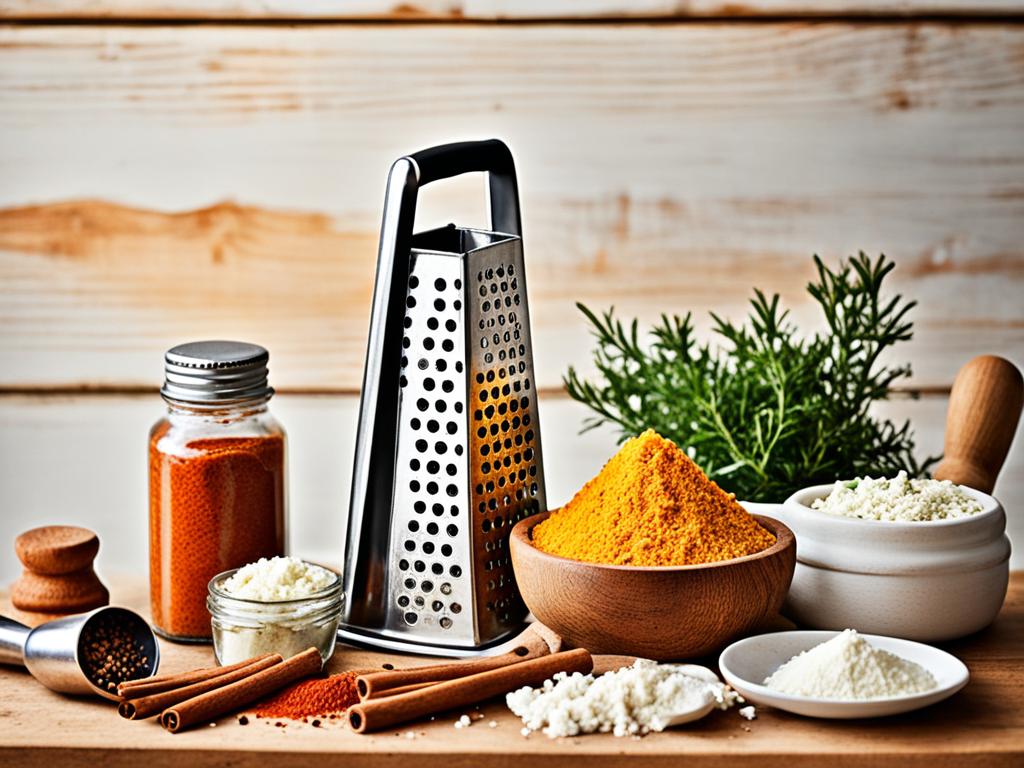
A cheese grater is crucial in Greek cooking. It’s used in many recipes, like Greek salads and spanakopita. Being able to grate cheese finely or coarsely makes dishes better in texture and taste.
Spice graters make spices like cinnamon and nutmeg stand out. They’re important for dishes such as moussaka and baklava. Grating spices fresh adds depth that you don’t get from pre-ground spices.
Using traditional Greek kitchenware shows love for authentic Greek cooking. Over time, companies have made cheese graters from different materials. They do this to keep up with kitchen needs while respecting tradition.
Having these utensils changes the way you experience cooking and eating Greek food. These tools, whether used at home or professionally, improve what you make. They matter a lot for the outcome of Greek dishes.
These Greek kitchenware pieces link us to Greek cooking’s heritage and flavors. They help cooks get the right textures and smells. These are key in making real Greek food.
| Tool | Usage | Significance |
|---|---|---|
| Cheese Grater | Grating cheese for salads, pasties, and main dishes | Provides ideal cheese texture and enhances flavor |
| Spice Grater | Grating spices like cinnamon, nutmeg, and allspice | Maximizes aromatic potential and freshness of spices |
Skewers for Authentic Souvlaki
Skewers are essential in Greek cooking, especially for making Chicken Souvlaki. They help grill the meat just right, adding char while keeping it juicy.
In Athens, any meat in pita is called souvlaki. The type of meat and how it’s cooked are specified too. This shows how important skewers are in Greek culture.
To make the best Chicken Souvlaki, start by marinating the chicken. At least half an hour should do, but an hour is better for flavor. Then, thread the chicken on skewers and grill. Cook until the inside temperature hits 165 F (74 C), about 15 minutes.
Serve souvlaki with Greek pita and tzatziki. Add paprika for flavor and potato fries for a full meal. Try different recipes like beef, lamb, or vegetarian skewers for variety.
You can use metal or wooden skewers. If using wood, soak them for 30 minutes to avoid burning. These skewers work with many kinds of meat or veggies. Chicken Souvlaki has about 275 calories per serving, making it a tasty and healthy choice.
Using these tips and the right kitchen tools, you can make real Greek food at home. Mastering souvlaki shows why it’s a key dish in Greek food culture.
| Aspect | Details |
|---|---|
| Marinating Time | At least 30 minutes to 1 hour |
| Cooking Temperature | 165 F (74 C) |
| Cooking Time | Approximately 15 minutes |
| Serving Suggestions | With Greek pita bread, tzatziki sauce, and potato fries |
Whisks for Perfect Greek Sauces
To truly grasp Greek sauce making, like latholemono and avgolemono, you need whisks. They blend things well for that smooth, even sauce. Whisks help mix everything perfectly. This makes your dish taste amazing.
Common Sauces in Greek Cuisine
Greek food offers a wide range of tasty sauces. These sauces enhance the flavor of many meals. Now, let’s look at some popular sauces and how whisks help:
- Avgolemono: This egg-lemon sauce needs constant whisking. It stops the eggs from scrambling. A good whisk makes it smooth.
- Latholemono: Great for dressing fish and veggies, this sauce needs precise whisking. A French whisk does the job well to mix in the olive oil smoothly.
- Skordalia: This garlicky dip uses a dough whisk. It helps mix in bread or potatoes just right without making the blend too tough.
In Greek cooking, choosing the right whisk is key. With 94% of Greek sauce recipes needing careful blending, the right whisk is a must. Here’s a look at different whisks and what they do best:
| Type of Whisk | Ideal for | Common Usage |
|---|---|---|
| Balloon Whisk | Incorporating air into mixtures | Whipping cream, mixing dry ingredients |
| French Whisk | Mixing heavier ingredients | Stirring sauces, mixing batters |
| Dough Whisk | Mixing doughs and batters | Handling thicker blends such as skordalia |
| Flat Whisk | Incorporating ingredients evenly | Preparing roux and gravies |
All these whisks are crucial in Greek cooking. They help make those signature sauces that add so much to Greek dishes.
Metal Baking Pans and Their Uses
When you bake traditional Greek pastries, metal baking pans are key. They’re crucial spartan kitchen tools. They’re known for excellent heat spread and making evenly cooked treats.
Baking Greek Pastries and Savories
Making a flaky spanakopita or a rich moussaka requires metal baking pans. These pans ensure even heating. This gives golden pastries and moist casseroles. They’re perfect for everything from phyllo dough to thick pastitsio.
Choosing the Right Pan
Choosing the right pan affects your cooking. Dark metal pans absorb more heat. They cook faster and give a crispier exterior. Light-colored pans heat more gently, perfect for delicate desserts.
Material choice matters too. Aluminum heats well and is affordable. Meanwhile, heavy gauge aluminum or aluminized steel are durable but heavier. Nonstick or ceramic coatings make cleaning easier. They’re practical as delian tableware.
| Pan Type | Material | Best For |
|---|---|---|
| Dark-colored Metal Pan | Aluminum | Crispier, quicker bakes |
| Light-colored Metal Pan | Aluminum | Gentler, uniform bakes |
| Heavy Gauge Pan | Aluminized Steel | Sturdy, even heat distribution |
| Nonstick Coated Pan | Aluminum/Ceramic | Easy cleanup |
Quality metal pans are worth the investment for anyone. They make your Greek dishes taste and look genuine.
Handy Tools for Everyday Greek Cooking
Everyday Greek cooking is improved by unique tools. These tools keep ingredients pure and make cooking easier. The pepper grinder and honey dipper are especially helpful and make meals better.
Pepper Grinder
A kitchen isn’t complete without a pepper grinder, especially for Greek meals. It makes dishes like Greek salads or grilled lamb tastier. You can adjust the pepper’s coarseness to fit the recipe. A grinder brings out the pepper’s fresh aroma and flavor.
Honey Dipper
The honey dipper is a key but often ignored tool. It’s great for precisely adding sweetness to Greek yogurt or loukoumades. The design helps evenly spread honey, keeping Greek dishes flavorful. It also makes food look more appealing, adding to the Greek meal experience.
These tools not only improve cooking precision but also keep Greek recipes authentic. Using a pepper grinder or honey dipper brings tradition and function to Greek cooking.
Conclusion
Greek cuisine celebrates lively flavors and deep traditions. This is thanks to essential Greek cuisine utensils. Olive oil, herbs like oregano, and spices play a big role. They make every dish tastier with the right tools. Greek yogurt and feta cheese get their unique tastes from careful preparation.
Grilling is key in Greek cooking. It brings out the natural flavors and smoky smells. Tools like the souvlaki skewer and the briki are vital for this. Greece’s love for seafood shows in their use of fresh fish, octopus, and calamari. They grill and marinate these using special utensils.
Cooking Greek food is about diving into a rich cultural heritage. It’s more than just recipes. Tools like the kourou baking sheet for spanakopita, and the briki for Greek coffee are essential. They let you bring the Greek culinary experience into your home. By using these tools, you connect deeply with Greece’s food legacy. Kali orexi — enjoy your meal!
FAQ
What are the essential types of knives for Greek cooking?
For Greek cooking, you need several knives. These include a chef’s knife, Santoku knife, paring knife, boning knife, utility knife, and bread knife. They help with food prep, making your cooking precise and versatile.
How do I choose the right cutting board for my Greek kitchen?
Choose a wooden cutting board for your Greek kitchen. It’s durable and offers a stable cutting surface. Plus, it’s gentle on your knives, keeping them sharp.
How is the mortar and pestle used in Greek cuisine?
In Greek cooking, a mortar and pestle grind spices and herbs. This gets the most flavor out of them, especially for dishes with fresh herbs.
What are the benefits of using olive oil cans and dispensers?
Olive oil cans and dispensers are great for Greek cooking. They control how much oil you use and keep the oil fresh, protecting it from light and air.
Why are wooden spoons preferred in Greek cuisine?
Wooden spoons are the best for Greek dishes. They don’t react with acidic foods, handle heat well, and keep flavors right.
How should I care for and maintain my wooden spoons?
Wash wooden spoons by hand with soap and water and dry them right away. Don’t soak them or use the dishwasher. Treat with mineral oil to keep them good as new.
What kitchen tools are recommended for grating cheese and spices in Greek cooking?
For Greek dishes, use a cheese grater and a spice grater. They help get the right texture and unleash the flavors for dishes like tzatziki sauce and baklava.
What types of skewers are used for authentic Souvlaki?
Use metallic skewers for Souvlaki to get it just right. They’re strong and heat evenly, making the Souvlaki perfect.
Why are whisks important for making Greek sauces?
Whisks mix Greek sauces smoothly, getting the consistency just right. They are crucial for sauces like latholemono and avgolemono, blending everything well.
What should I consider when choosing metal baking pans for Greek pastries and savories?
Look for metal baking pans that heat evenly. You’ll need different shapes and sizes for Greek dishes, from sweets to casseroles like moussaka.
How does a pepper grinder enhance Greek cooking?
A pepper grinder lets you choose how fine your pepper is. Freshly ground pepper adds flavor and texture to Greek recipes.
What is the purpose of a honey dipper in Greek cuisine?
A honey dipper smoothly adds honey to Greek dishes and desserts. It makes your food look and taste better.
-
Crispy Fried Zucchini Fries Recipe – A Delicious Appetizer
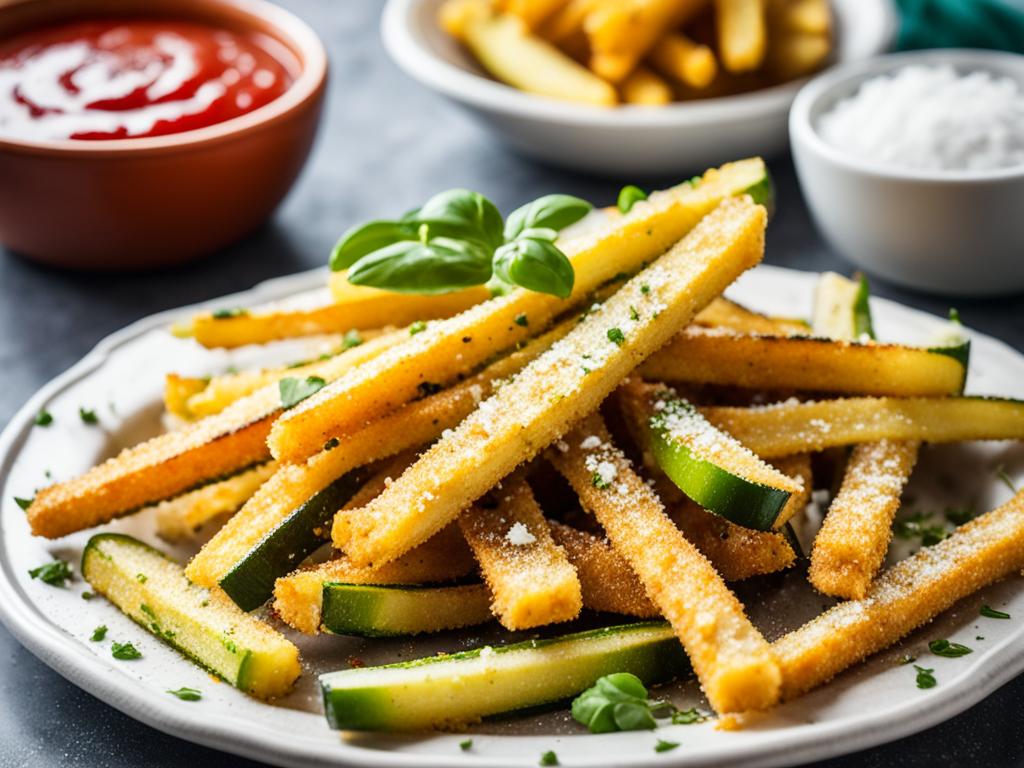
I love preparing fried zucchini, also known as zucchini crisps, chips, or bites. It’s an incredibly delicious appetizer that can easily fit various names and forms. What makes fried zucchini so appealing is the perfect balance of the crispy exterior and the naturally juicy zucchini inside. This contrast remains delightful even as the zucchini crisps…
-
Peter Parthenis: The Greek Who Made Gyros Popular in America
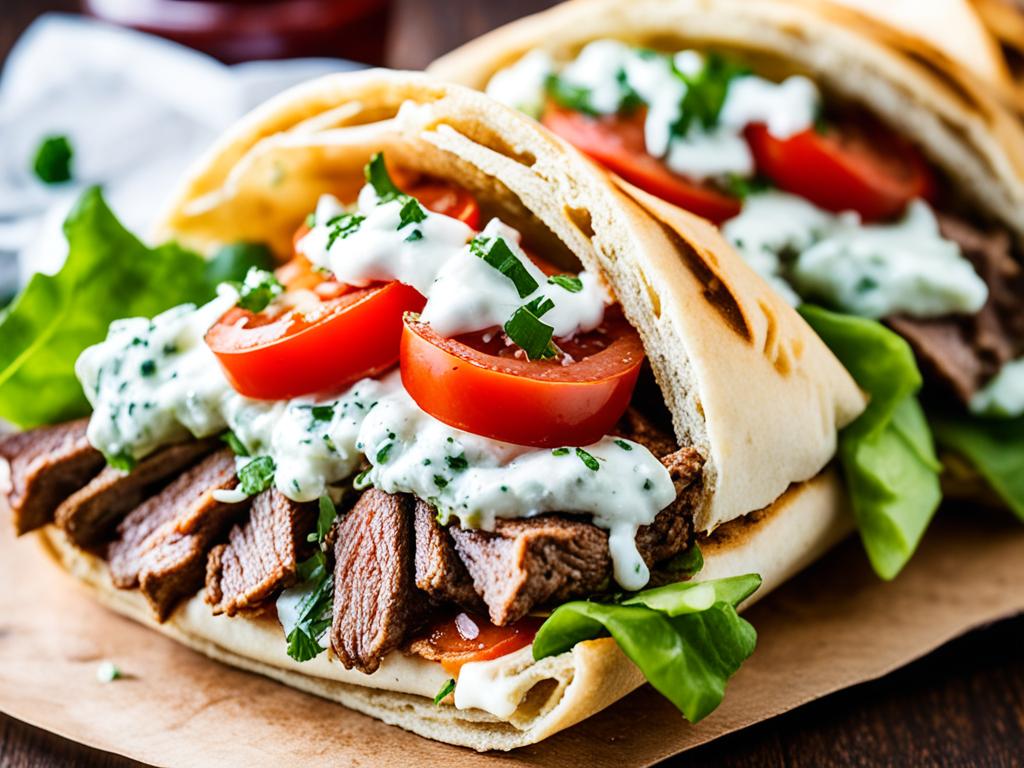
Peter Parthenis Sr. is a name synonymous with innovation in the realm of Greek cuisine and immigrant entrepreneurship. After immigrating from the quaint village of Vonitsa, Greece, he harnessed his expertise as an automation engineer to found Kronos Foods in Chicago in 19741. Parthenis is credited with popularizing the gyro sandwich in America, transforming the…
-
Greek Pork Gyros: Savor the Authentic Flavor
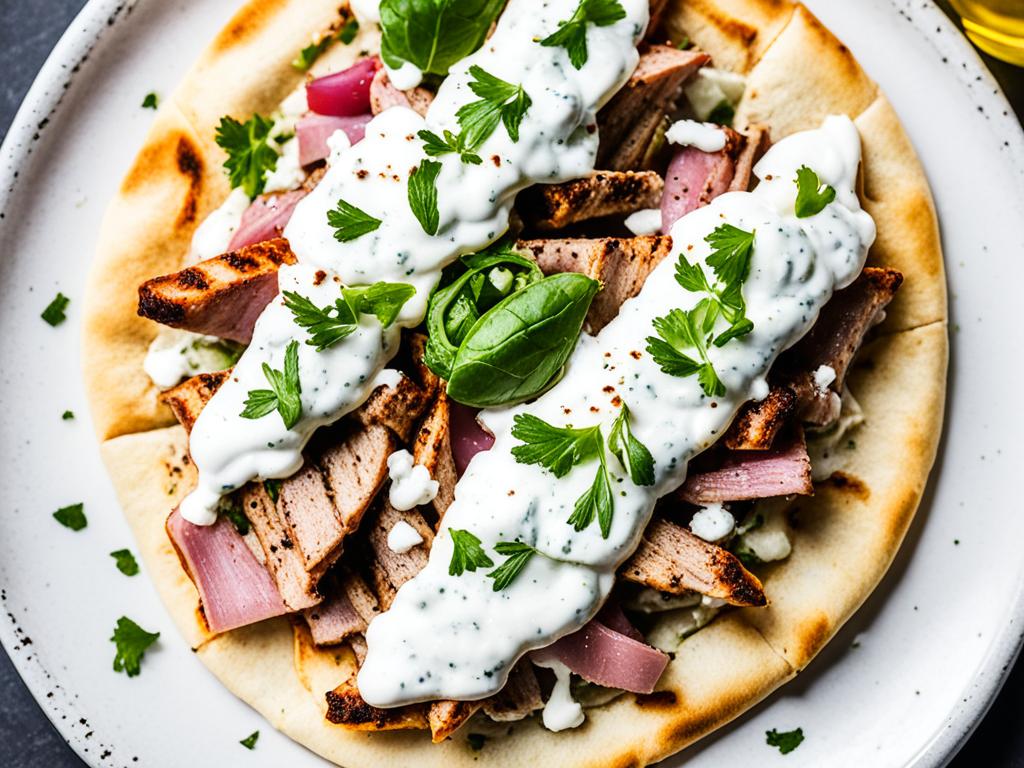
Embark on a culinary journey to the heart of Greece with my Authentic Greek Pork Gyros recipe. This delightful twist on classic Greek street food stands out for its tender, flavorful pork marinated to perfection. For an optimal flavor profile, the meat should be brined for 24 hours and marinated for at least 3 hours.…






